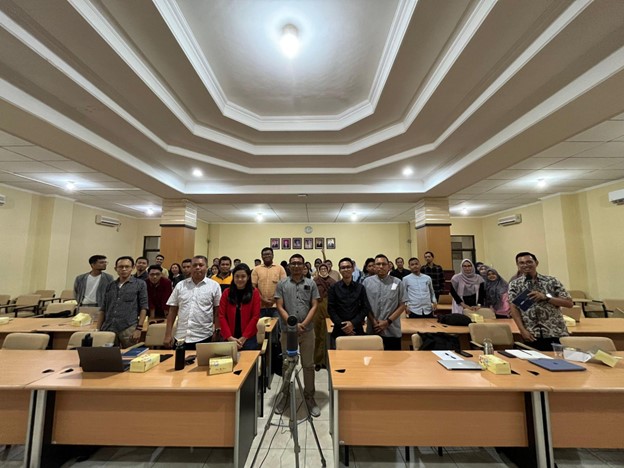

The Leadership and Public Policy Innovation (KIK) Program at the Graduate School of Universitas Gadjah Mada organized a training titled “Jurnal Predator: Jangan Jadi Mangsa” on Wednesday (13/11), both in-person at the Prof. Dr. Agus Dwiyanto, MPA Auditorium, Masri Singarimbun Building, and virtually via Zoom meeting. This training was aimed for master and doctoral students of the KIK program to provide them with an understanding of the importance of choosing credible journals and avoiding predatory journals that could harm the reputation and quality of their scholarly work.
The Chief of the KIK Master Program, Prof. Dr. Ahmad Maryudi, who is listed at the World Top 2% Scientists 2024 of Stanford University and Elsevier, was one of the speakers at the training. His expertise in this field made him the ideal speaker for this important topic. Prof. Maryudi emphasized the importance of understanding the characteristics of reputable journals and the risks that may arise from publishing in predatory journals.
During the training session, Prof. Maryudi explained the criteria for identifying predatory journals. “Several indicators that we should be suspicious of when determining whether a journal is a predator include a lack of transparency in the editorial process, aggressive solicitation of manuscript submissions, and lack of proper indexing,” explained Prof. Maryudi. He pointed out that these journals often prioritize profit over academic integrity, which can lead to detrimental consequences for researchers, especially students who are still building their academic profiles.
The event drew significant interest from many participants, with students eager to learn about the ins and outs of academic publishing. Many expressed concerns about the increasing prevalence of predatory journals in academia and the challenges they face as early-career researchers. The training provided a platform for students to engage in discussions and raise questions about their experiences and concerns related to journal selection.
In addition to the theoretical aspects, the training also included practical exercises where students analyzed various journals to determine their credibility. Prof. Maryudi demonstrated how to search for credible journals using the Scimago and Scopus websites. This hands-on approach allowed participants to apply the knowledge they gained and develop the critical thinking skills necessary to navigate the complex world of academic publishing.
Author: Asti Rahmaningrum
